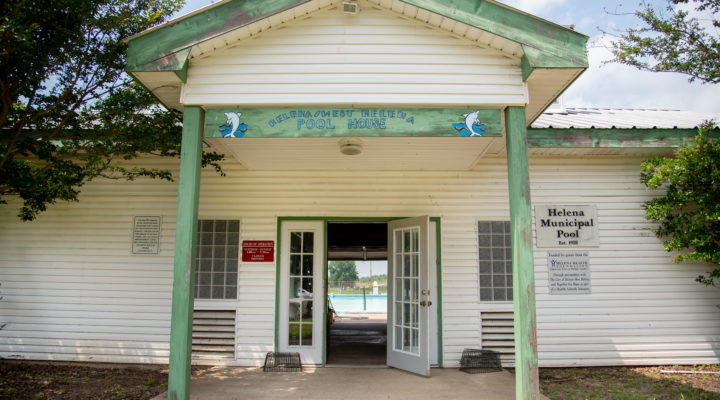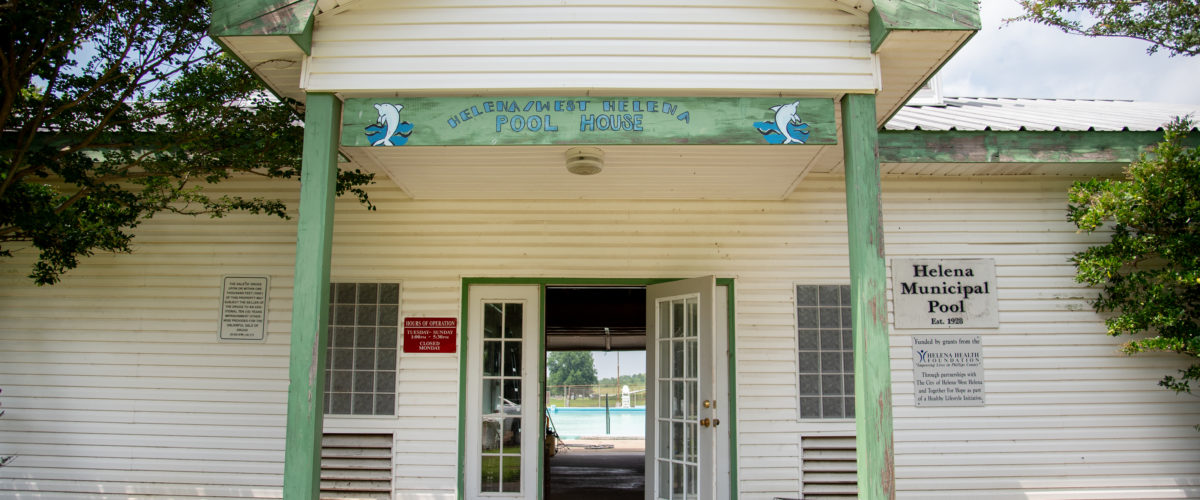North Helena Park is deserted, save for a midday chorus of cicadas and one lone pickup truck parked outside the pool house. A stone’s throw east, the Mississippi River levee looms 20 feet high, sloping through parched, brown grass to an expanse of delta post oaks, a blistering tennis court and the crown jewel — an 85-year-old swimming pool the size of a small parking lot. At first glance, the white-washed pool shed appears undisturbed, but through the breezeway pool manager Earnest Womack is neck-deep in a jam: the pool has sprung a leak. To repair it, he will have to pry through yards of concrete and Depression-era piping. Worse, he only has two weeks until 150 kids flood the front door for the start of swim camp, the long-awaited highlight of Together for Hope Arkansas’s year with Helena’s children.
For now, only Womack inhabits the pool house and takes a seat in the shade. He peers through a two-tone pair of retro frames. The glasses, coupled with his soaring stature, make first impressions downright stately – the kind of stately that can still rock a candy-red Central High School class of ’85 t-shirt. His peppery beard reveals just enough gray to confirm the shirt’s authenticity. Nonetheless, Womack grew up at this pool. He was born in Helena, and, like most members of Phillips County’s black community, learned as a child to live almost seamlessly below his family’s federal poverty threshold.
“It’s a weird thing to grow up poor,” Womack says. “You don’t actually know it while you’re going through it, because everybody in the community is pretty much going through the same thing you are.”
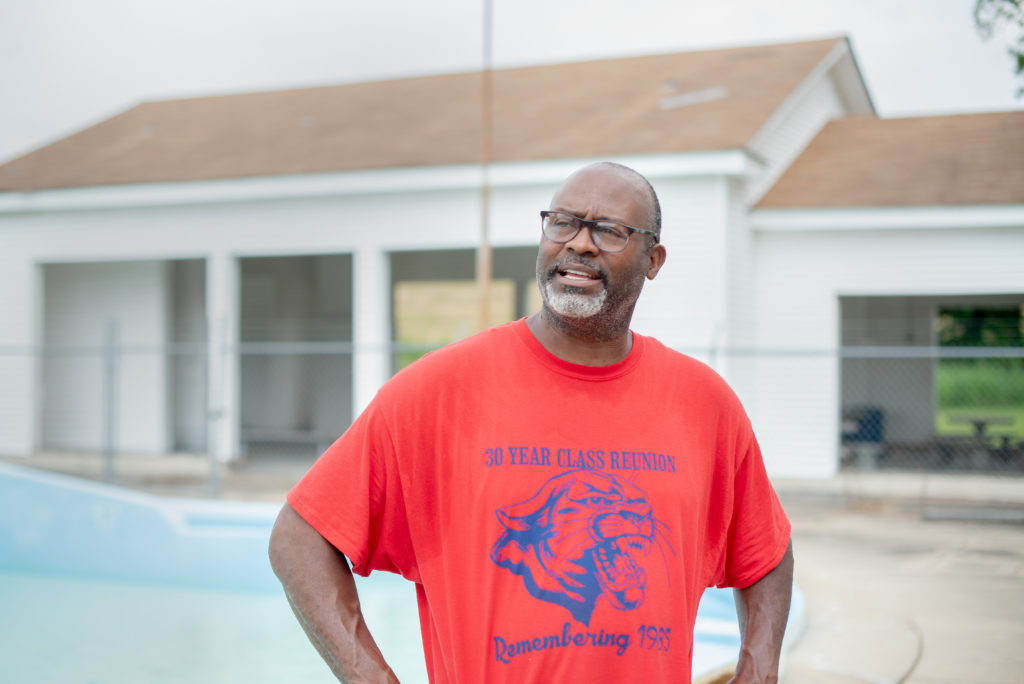
Earnest Womack was born in Helena, worked as a lifeguard at the Helena pool since age 16, and now works as pool manager, partnering with Together for Hope to offer Swim Camp to Helena’s children and youth.
The situation is the same with kids in Helena today, he explains. Except for one major difference – the Comprehensive Employment and Training Act, a Nixonian public works law that employed Womack and 300 of his high school peers during summers in Helena. In fact, the 1973 U.S. Congress enacted CETA as an extension of the nationwide, Depression-era Works Progress Administration, which built the Helena swimming pool in the 1930s. Because of CETA, Womack took a job at that very pool during high school and began a nearly 30-year career as manager and lifeguard instructor.
“Man, you just don’t know how that impacted my household,” he says, shaking his head resolutely. Despite his family’s low income, Womack’s CETA job allowed him to buy his own school clothes, go where he pleased and “just be able to enjoy some of the normalities of life,” he says. Now that public works projects are virtually antique, Delta kids need something to focus on, he says, something to move toward with discipline, something that will open up a new world of ideas. That’s why, for nearly 20 years, Womack has partnered with Together for Hope Arkansas as they seek the development of Helena’s youngest and stoke their imaginations for what lies beyond the limitations of poverty. And for the better part of that 20 years, it all took place at a swimming pool.
That’s the trick of rural development with children, says Janee’ Jones Tisby, director of TFH Arkansas. “It can literally be whatever you want it to be. As long as you execute, you can take kids to Spain, start a sports program or anything in between, and, nine times out of ten, the community responds with a resounding ‘Yes!’” That’s because “anything is going to be better,” Tisby says, especially in a remote town where the median household income remains less than $20,000, one of the lowest in the nation. Ultimately, children and teenagers in poverty lack opportunity, Tisby explains, not merely to have wealth, but to access more overlooked resources that help make a kid well-rounded — “whether it’s lots of books on their level at home and at school or just being able to find their passions, like playing soccer or a different kind of extracurricular, or going to the doctor when they’re sick or just sitting in their classroom and focusing because their basic needs are taken care of.”
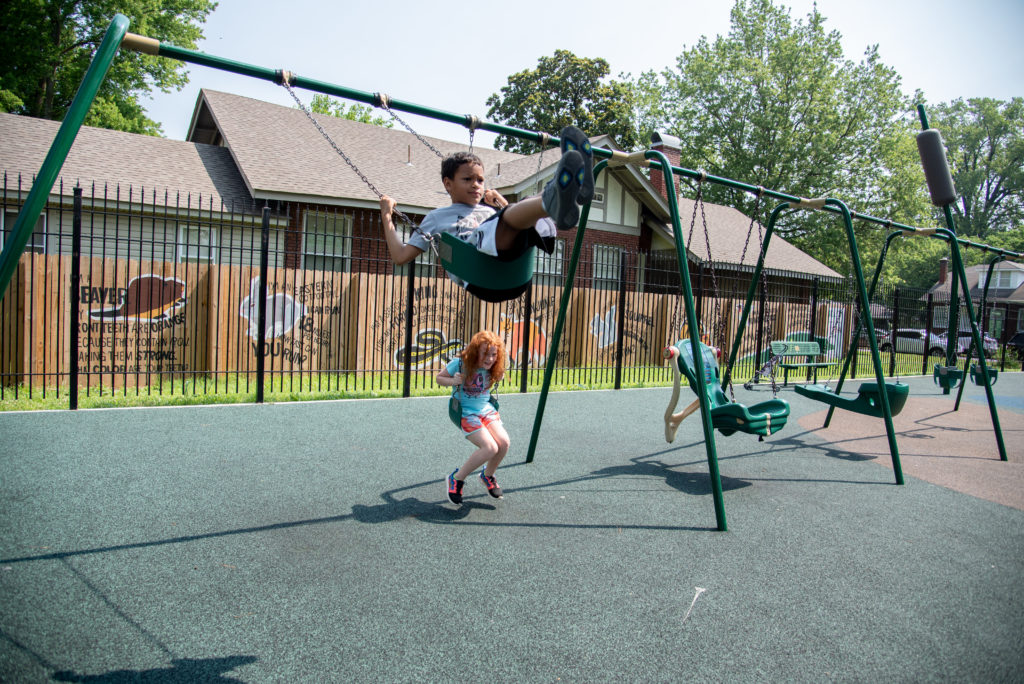
The opening of Freeman Playground marks the start of summer for Together for Hope.
While TFH Arkansas engages each of those needs, the first and last words on everybody’s lips are “swim camp,” where a year of child development crescendos at the Helena pool for two weeks of swim lessons, lifeguard training, and water aerobics for all ages. Yet, more than a refreshing dip, the chlorine waters have become a kind of microcosm for Helena youth’s battle with the limitations of poverty, a kind of proving ground for developing focus and imagination, Earnest Womack says.
“Kids learn by examples, and when they are part of something positive, they naturally follow those things,” says Womack, who has trained a generation of teenagers to be lifeguards at the Helena pool.
First, kids want to overcome their fear of the water and learn how to swim. Then, they can barely wait to become a teenager and undergo lifeguard training. All the while, teenage alumni of swim camp can move deeper with Together for Hope’s Camp Go, a cohort for learning leadership skills and shadowing volunteer staff. Womack recalls the Hampton brothers, who grew up attending swim camp, became lifeguards and are now off to college – often an unlikely destination for young people in Helena. Swim camp, he says, can help children and teenagers break through the short-sightedness of poverty by inspiring them to work toward a long-term goal.
“Through the impact of the discipline of those things,” Womack says, “they learn how to have a focus on something and then be able to go toward it and not lose that focus. Sure, there will be things that shake you along the way, but hey, the goal is to get where you’re trying to go. Most of them do.”
But no matter what, Womack laments, some fall through the cracks. When young people start to believe that the limitations of poverty are their own, he explains, they begin to choose destructive paths, namely those that involve drugs or violence. Just two weeks ago, a group of siblings who grew up in TFH’s swim camp got into a scuffle with a suspected adversary at Franklin and Elm Street. As the fight escalated, one of the siblings pulled out a gun and opened fire, leaving 22-year-old Dominic Otey dead in the middle of the street. It’s difficult, maybe impossible, to understand why some sell out for violence, Womack says, but the impact of poverty is strong.
“That’s a tragedy to me,” he says, casting his eyes to the floor. “They had the same opportunities, the same community, but they just go different paths.”
After all, Womack admits, why would Helena’s black community, especially teenagers growing up in poverty, trust that any outsider has their best interest at heart? It’s no secret that black folks in Helena carry 96 percent of the poverty. Even Womack himself was wary when TFH field personnel Ben and Leonora Newell first came to Helena in 2000 searching for ways to help local children grow. The Newells began at Helena’s north end, a neighborhood formerly deserted by white families and left tattered for much of Helena’s black community.
Kate Hall, member of Hayes Barton Baptist Church in North Carolina and the original architect of swim camp, accompanied the Newells during that initial summer and recalls hosting their first camp in a half-burned-out armory. They quickly tired of sweeping broken glass and charcoal, Hall says, so they wandered a few blocks over to North Helena Park where the swimming pool laid vacant. Apart from having no swim instructor, the pool cost $1 for entry, which wasn’t in the budget for many north Helena families.
When Hall first approached Womack at the pool, he seemed more than slightly unimpressed by 12 white “nice little do-gooders who are going to be out of here soon,” Hall says, laughing. On the contrary, Hall tenaciously brokered a deal with Womack to allow the TFH team into the pool area every morning, where they would hand out dollar bills for entry and teach children to swim. Yet, even to Hall and her team, the audacity of swimming in a mostly black public pool was unmistakable. One morning, while Hall was supervising a shallow-end game of ‘Ring Around the Rosie’ for preschoolers, a 4-year-old black girl suddenly shifted her gaze toward the deep end.
“Miss Kate,” she pleaded, “they’s white people in this pool.”
“You’re right,” Hall replied.
“Miss Kate,” she repeated, looking curiously up at Hall, “You’s white.”
“You’re right,” Hall answered, this time with a grin.
“Miss Kate,” the girl appealed once more, “my momma says white people and black people aren’t supposed to play together.”
“Do you know what?” Hall said. “This week we are gonna have so much fun playing together in this pool and that’s what this is all about. We’re just gonna all have fun together.”
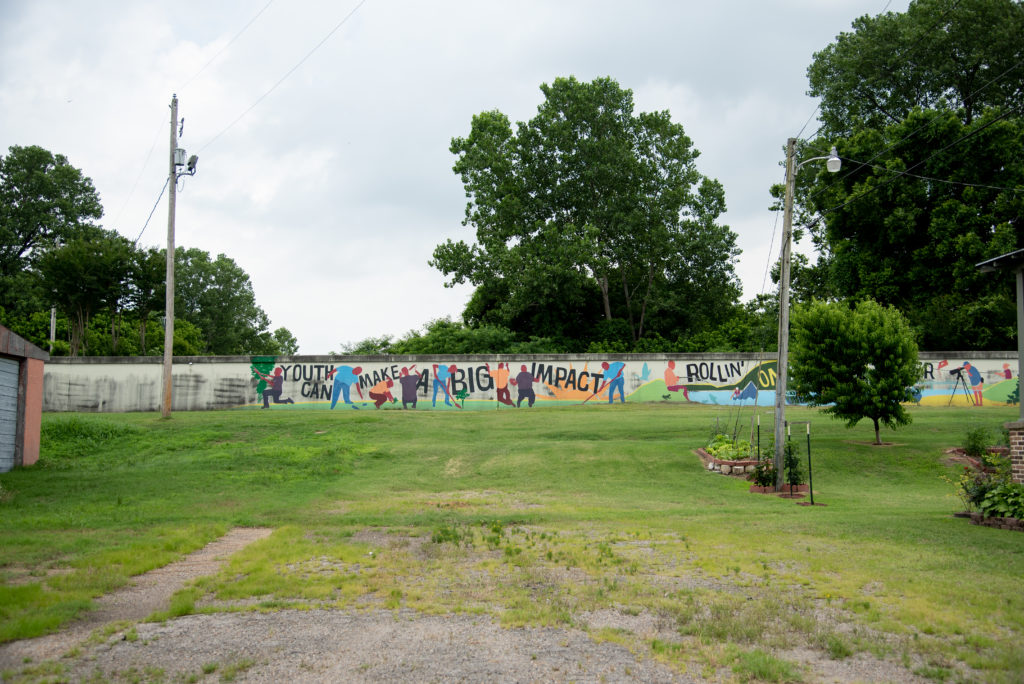
A mural atop the Mississippi levy in Helena, Arkansas. Despite carrying a 43% share of Helena’s poverty by age, Together for Hope is investing in children, Helena’s best hope for breaking the cycle of generational poverty.
The acute role of swimming pools in Jim Crow segregation was not lost on Hall and TFH, nor on Helena’s black community as swim camp took form. Since the Depression-era wave of investment in public swimming pools, exclusive access to those pools – especially in the blistering heat of mid-summer – was a hallmark of white supremacy in the United States. While millions of white Americans created a culture around swimming, cities reserved a mere fraction of public pools for black Americans, who still today are half as likely as a white citizen to know how to swim. Subsequently, black children aged 5 to 14 experience three times as many unintentional drowning deaths, according to the Centers for Disease Control and Prevention.
Together for Hope was treading in sensitive waters, yet Hall began partnering with Womack to offer a unique form of power to Helena’s black youth. Within two years, swim camp took full form, featuring two four-day weeks with eight lessons per week for children 12 and under. In the evenings, teenagers swapped in for their own lessons and water aerobics. Hall even began teaching adults, many of whom were resolved to be able to swim with their children. As more learned, the north Helena community began to reclaim the pool and surrounding park as their own, all while Together for Hope covered the pool’s operating costs and offered free admission. Soon, walls came down, Hall says, and relationships at the pool modeled a new level of trust for children and teenagers.
“Poverty divides people,” Hall says, “but it’s really something to see these kids begin to form relationships with us, people of a different color, and open up conversation.
“You indeed are trying to teach a child a skill, but for you to effectively do it, that child has to build a certain amount of trust in you. Ultimately, for children to grow and learn from other people, they have to understand there will be people in their lives that they can trust that maybe they distrusted before. It’s a huge thing to open their eyes to that, but they began to trust me and I felt some of those barriers breaking away. I feel that every time I get in that pool.”
Back at the pool, Earnest emerges from the breezeway to ready his wheelbarrow. He’ll have to mix new concrete if he wants to fix the leak. The sound of steady trickling water echoes from the deep end as the pool steadily fills. Today, it’s only halfway full and the arctic-blue paint lining the pool’s surface is visible for the first two feet at least. Womack’s close friend Kate won’t join for another two weeks, so, for now, he soldiers on, determined to have the water ready for a new batch of swim campers. This year, like the last several, a grant from the Helena Health Foundation will support the pool’s operating costs for the remainder of the summer, so his work is cut out for him. Still, it’s a small price to pay to see the next generation of Helena’s children step nervously into the water.
Womack still runs into former campers at the grocery store, and they almost always take a moment to relive their poolside antics from years ago. Now, if he could only remember all their names, he says with a laugh. Either way, as children pass through the gate for the first time, prepared to trust and open themselves to a new kind of power, his hope lies with Helena’s youngest, he adds.
“My hope, always, is to see the little children when they get here, to be able to impact them in a way that they would not go down the pathway of violence but would always try to do the right thing even when nobody is looking. Being able to help, to share, to give good guidance and direction, being able to even mentor some of these kids – those are the things that give you a glimmer of hope.”
Read more in the Arkansas Delta series:
At the center of Helena, Arkansas’s fight against poverty and division: an 85-year-old swimming pool
Imagination is the greatest threat to Delta poverty, Together for Hope Arkansas says
Phillips County, Arkansas: Backwater Rising
Video: Janee’ Tisby on Volunteers
Video: Janee’ Tisby on Poverty
Video: Earnest Womack on the Pool
Video: Earnest Womack on Poverty
Related commentary at baptistnews.com:
Survival mode | Jason Coker
Reimagining churches as full-time partners with those in poverty | Laura Rector
Related news at baptistnews.com:
Hope blooms in the Arkansas Delta, thanks to ministry team
Like the rising river of the Arkansas Delta, the persistence of poverty still looms just over the levee, threatening to wash young people down paths of violence, drugs, food insecurity, unemployment, and early death. That’s why Together for Hope is committed to growing the gifts and dreams of Helena’s children as they seek to interrupt cycles of generational poverty and instill lasting hope in the Delta’s youngest.
This series in the “Resilient Rural America” project is part of the BNG Storytelling Projects Initiative. Has the United States forgotten its countryside? What strength and resilience may yet be stirring outside our city limits? In “Resilient Rural America,” we attempt to answer these questions when we visit these unique communities to examine the singular nature of poverty in rural America and tell the stories of development among its courageous and resilient people.
_____________
Seed money to launch our Storytelling Projects initiative and our initial series of projects has been provided through generous grants from the Christ Is Our Salvation Foundation and the Eula Mae and John Baugh Foundation. For information about underwriting opportunities for Storytelling Projects, contact David Wilkinson, BNG’s executive director and publisher, at [email protected] or 336.865.2688.

